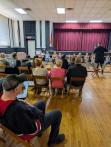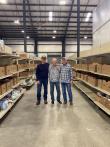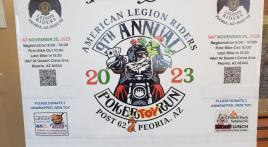AMERICAN LEGION POST 117
VETERANS DAY CEREMONY
HON. ROBERT J. WITTMAN
OF VIRGINIA
IN THE HOUSE OF REPRESENTATIVES
Thursday, November 19, 2015
Mr. WITTMAN. Mr. Speaker, I rise today to
submit a Veterans Day speech written and delivered
by Mr. Don Hirst to American Legion
Post 117 on Veterans Day 2015.
November 19, 2015 CONGRESSIONAL RECORD—Extensions of Remarks E1669
[From American Legion Post 117 Veterans
Day Ceremony, Nov. 11, 2015]
AMERICAN LEGION POST 117 VETERANS DAY
CEREMONY
(By Don Hirst)
Good morning and thank you all for coming
to Post 117’s Veterans Day Event.
Let me start of by asking for a show of
hands, to include family members and surviving
spouses. Please leave them up until
I’m finished with a few brief questions, if you
can.
How many of you are veterans of World
War II? Of the Korean War? The Cold War?
Vietnam? Grenada, Panama or similar actions?
Desert Storm? Afghanistan? Iraq? Deployments
to support any of those action or
similar ones I’ve overlooked?
Now look around the room. Quite a lot of
hands, right? Okay, please put them down
and relax while I make a few observations
and comments. Everyone who raised a hand
is a veteran, or a significant part of a veteran’s
family. Some of you may even be
both.
Today is Veterans Day, and that’s why
we’re gathered here and in tens of thousands
of other places across the nation and the
world: to mark an important date in America’s
history. For us, it’s a day that represents
a whole lot more than big sales at
the supermarket, shopping mall or car dealerships.
Yeah, we all may take part in some
of that, but we know to the core of our being
that it’s intended to honor those who served
the nation and served it well. You’re all part
of that select group. Many of you bear scars,
physical or otherwise, as a result of your
service.
So what does it mean to be a veteran? In
the minds of a lot of folks, a veteran is someone
whose service is over, tour of duty ended.
That’s a long way from the truth. Especially
in today’s world, with all of the dangers and
challenges that seem to be popping up everywhere.
Kind of like a grim version of Whacka-
Mole.
As I sat writing this a couple of days ago,
the news reports once again trumpeted more
acts of violence against the nation’s citizens.
Two American trainers—civilians but working
to help train police in Jordan, a U.S. ally
headed by a courageous leader with extensive
military experience and service—were
gunned down in an apparent blue-on-blue attack.
They were murdered by a Jordanian officer.
This wasn’t the first such case we’ve
encountered in recent years and in different
locations. It won’t be the last, either. You
can take that to the bank.
The list of incidents, both overseas and, increasingly,
at home here in the United
States, grows with each flip of the calendar
page. Unless you’re totally ignorant, oblivious
or intellectually challenged—or a combination
of all three—you sense with a growing
feeling of foreboding that we are at war.
So what do we do about it?
This isn’t the venue to get into partisan
political discussions, something we’re not
supposed to do at official events since we’re
part of the American Legion and thus have
nonprofit, tax-exempt status. We Legion
members each have our own political beliefs,
but we’re a nonpartisan organization. We do
our politicking informally, over a beer, and
at the local precinct ballot box each election
day. As an aside, I hope all of you voted on
November 3 and repeat that civic duty in the
coming year. Voting is a precious right. That
right was earned by blood sacrifices of the
past, and is kept alive by the sacrifices that
will come.
But let’s get back to the ‘‘what do we do
about it?’’ part. The situation is serious—and
getting worse. The historian in me says that
we arguably haven’t been in such perilous
times since the 1930s. Back then we saw economic
chaos, the rise of Nazi Germany, Japanese
militarism and a continued avoidance
of taking action by the great democracies of
the world.
Finally, of course, we did act, winning a
stunning, hard fought victory against the
forces of pure evil. We won, and that’s a fact
beyond dispute. But we paid a much higher
price for that victory by not acting sooner,
when decisive action may well have saved
millions from a horrible fate.
I think we’re at such a crossroads today.
Even a casual glance at the headlines shows
how dangerous it is right now. And it’s likely
to get worse before it’s over.
As the horizon grows darker, I believe it’s
a good idea to take stock of where we are,
what assets we have and what we can do
about it. I’m not advocating forming a militia
of disgruntled, angry veterans or vigilante
groups. But I am strongly urging us as
free citizens, neighbors in the vibrant, close-knit
communities of the Northern Neck, to
stand up and stand together so that we are
better prepared for what may come.
It’s like insurance. You might not need it
right this second, but when you do, it’s too
late to buy a policy after the flood waters
reach the second floor of your home or the
volunteer fire department battles the blaze
threatening your house.
Now let me ask for one more show of
hands. Are there any members of our local
government, our sheriff’s department or
other similar agencies here today? Please
raise your hands. And if there aren’t any
hands up, I expect that more than one person
here today is acquainted with such folks and
can help spread the word.
You saw a few minutes ago how many people
raised their hands when I asked about
prior military service. They’re veterans.
They’re experienced. They’ve been in the
tough places, done the tough jobs. And
they’re an extremely valuable asset that
shouldn’t be overlooked in future times of
need. Those times could be months or years
from now—or maybe never come. Or they
could be this afternoon or tomorrow. Think
Pearl Harbor. And 9–11.
So I urge the local authorities to reach
out, to connect with us, the veterans who are
your friends and neighbors. We’re here, we’re
near—and we’re something you should put in
the emergency kit. This T-shirt I ordered
[holds up T-shirt in front of the audience]
came in the mail just in time for Veterans
Day. Rather than wear it under my shirt, I
wanted to use it to reinforce my point. I
don’t know if you all can see it, but the inscription
on the back says,
VETERAN.
Don’t Think Because My Time Has
Ended
That I Won’t Suit Up Again &
Protect This Flag
Against Terrorism
On American Soil
I’d add protecting against other threats to
the terrorism part, because that’s what we
can do, too.
At the dawn of the birth of our nation, a
group of poorly armed patriots stood together
at Concord Bridge to fight for their
freedom against the might of the British
army. Standing strong against great odds
also is the theme of the epic poem ‘‘Horatius
at the Bridge’’ written by English poet
Thomas Babington Macaulay in 1842. The
poem tells of a time in ancient Rome when
the citizens wanted self-rule against kings
and tried to hold the city against the king’s
attacking army. One bridge across the Tiber
River had to be demolished by the defenders
for the city to hold, but they needed time to
do it.
Horatius, a valiant Roman soldier, and two
stalwart comrades-in-arms, stood shoulder-to-
shoulder at that bridge. They bought the
time needed. It was Winston Churchill’s favorite
poem, and a few short verses tell you
why:
Then out spake brave Horatius,
the Captain at the Gate.
‘‘To every man upon this earth
Death cometh soon or late.
And how can man die better
Than facing fearful odds
For the ashes of his fathers
And the temples of his gods."
So saddle up, fellow veterans. We’ve got a job
to do. See you at the bridge!




